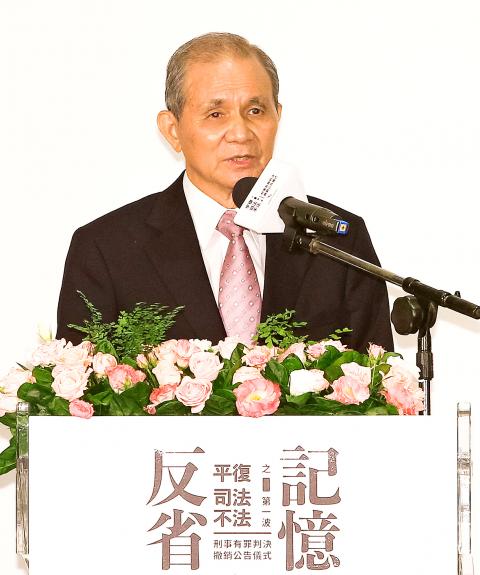Huang Huang-hsiung (黃煌雄) yesterday resigned as chairman of the Transitional Justice Commission after an uproar last month concerning an alleged plan by his former deputy to target a Chinese Nationalist Party (KMT) mayoral candidate.
Huang said in a statement that he took the reins in May with the belief that transitional justice would provide legitimacy and legality for past democratic movements, transcending party politics.
“However, the Sept. 12 incident ruined the big picture and overshadowed the commission soon after its establishment with the stigma of being another Eastern Depot,” Huang said, alluding to the pan-blue camp’s comparison of the commission to a Ming Dynasty secret police and spy agency.

Photo: CNA
On Sept. 12, Chinese-language media reported a partial recording of an unofficial commission meeting on Aug. 24 called by then-commission deputy chairman Chang Tien-chin (張天欽), in which Chang allegedly discussed a plan to target KMT New Taipei City mayoral candidate Hou You-yi (侯友宜) using a lustration law.
Hou headed the Taipei Police Department’s Criminal Investigation Division in its failed attempt to arrest democracy advocate Deng Nan-jung (鄭南榕) at the office of his Freedom Era Weekly magazine in 1989. Deng refused to be taken alive and self-immolated in the office.
The incident raised doubts about the Executive Yuan-affiliated body’s impartiality, prompting calls from the pan-blue camp for the commission to be abolished.
Five of the six people at the meeting, including Chang, have resigned.
Huang said that the incident added to political distrust, making the already challenging task of transitional justice all the more difficult.
Huang said that while he was not made aware beforehand of the content to be discussed at an unofficial commission meeting that sparked the Sept. 12 incident, the mindset and views demonstrated that day nevertheless ran counter to the dangwai (黨外, “outside the party”) spirit, which he has adhered to for more than three decades.
“I shouldered the burden [of the chairmanship] for the sake of transitional justice. My letting go is also for the goal of transitional justice,” Huang said, adding that he hopes his resignation would allow the commission to renew and ensure its pursuits of “truth, responsibility, justice and reconciliation.”
Premier William Lai (賴清德) “reluctantly” approved Huang’s resignation after urging him several times to stay, the Executive Yuan said in a statement.
“The exoneration on Friday of wrongfully convicted individuals underscores the significance of the commission’s role in realizing transitional justice,” the Executive Yuan said, adding that Lai appreciated Huang’s bravery in shouldering the strenuous task and admired his decision to take responsibility for the scandal.
Commission member and spokeswoman Yang Tsui (楊翠) said that commission staff were not aware of Huang’s resignation beforehand and only learned yesterday that he had tendered oral resignations to Lai several times.
As the commission has a two-year deadline, its members and employees would continue its work despite Huang’s departure, Yang said.
According to the Act on Promoting Transitional Justice (促進轉型正義條例), a replacement chairperson is to be nominated by the premier and appointed with the consent of the Legislative Yuan.

CHAOS: Iranians took to the streets playing celebratory music after reports of Khamenei’s death on Saturday, while mourners also gathered in Tehran yesterday Iranian Supreme Leader Ayatollah Ali Khamenei was killed in a major attack on Iran launched by Israel and the US, throwing the future of the Islamic republic into doubt and raising the risk of regional instability. Iranian state television and the state-run IRNA news agency announced the 86-year-old’s death early yesterday. US President Donald Trump said it gave Iranians their “greatest chance” to “take back” their country. The announcements came after a joint US and Israeli aerial bombardment that targeted Iranian military and governmental sites. Trump said the “heavy and pinpoint bombing” would continue through the week or as long

TRUST: The KMT said it respected the US’ timing and considerations, and hoped it would continue to honor its commitments to helping Taiwan bolster its defenses and deterrence US President Donald Trump is delaying a multibillion-dollar arms sale to Taiwan to ensure his visit to Beijing is successful, a New York Times report said. The weapons sales package has stalled in the US Department of State, the report said, citing US officials it did not identify. The White House has told agencies not to push forward ahead of Trump’s meeting with Chinese President Xi Jinping (習近平), it said. The two last month held a phone call to discuss trade and geopolitical flashpoints ahead of the summit. Xi raised the Taiwan issue and urged the US to handle arms sales to

BIG SPENDERS: Foreign investors bought the most Taiwan equities since 2005, signaling confidence that an AI boom would continue to benefit chipmakers Taiwan Semiconductor Manufacturing Co’s (TSMC, 台積電) market capitalization swelled to US$2 trillion for the first time following a 4.25 percent rally in its American depositary receipts (ADR) overnight, putting the world’s biggest contract chipmaker sixth on the list of the world’s biggest companies by market capitalization, just behind Amazon.com Inc. The site CompaniesMarketcap.com ranked TSMC ahead of Saudi Aramco and Meta Platforms Inc. The Taiwanese company’s ADRs on Tuesday surged to US$385.75 on the New York Stock Exchange, as strong demand for artificial intelligence (AI) applications led to chip supply constraints and boost revenue growth to record-breaking levels. Each TSMC ADR represents

State-run CPC Corp, Taiwan (CPC, 台灣中油) yesterday said that it had confirmed on Saturday night with its liquefied natural gas (LNG) and crude oil suppliers that shipments are proceeding as scheduled and that domestic supplies remain unaffected. The CPC yesterday announced the gasoline and diesel prices will rise by NT$0.2 and NT$0.4 per liter, respectively, starting Monday, citing Middle East tensions and blizzards in the eastern United States. CPC also iterated it has been reducing the proportion of crude oil imports from the Middle East and diversifying its supply sources in the past few years in response to geopolitical risks, expanding